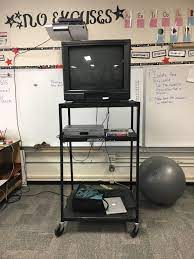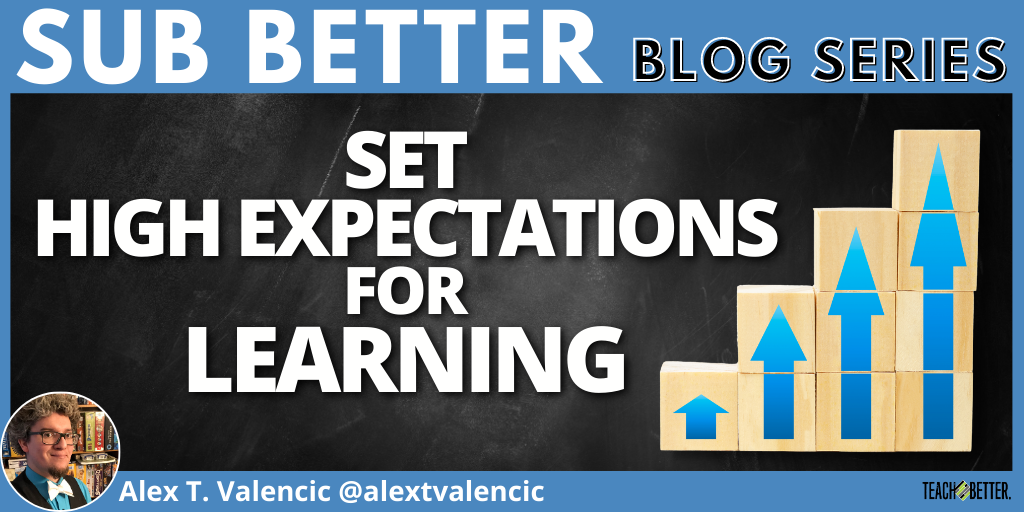TL;DR:
- Student learning can still take place when the teacher is not there.
- Hold students accountable for their own learning every day.
- Providing high-quality materials for teaching and learning is a shared responsibility.
- Learn tips for teachers and administrators to set high expectations for learning.
Set High Expectations for Learning
Think back to your elementary school days. Do you remember a time when your teacher was absent? What was the most common indicator to the class that something was different?
If your experiences were anything like mine, it was probably the sight of this in the front of the room:

You and your classmates were probably excited by the prospect of a movie day. You knew that, as long as you stayed relatively quiet and didn’t make any major disruptions, you’d be able to spend the day at your desk or, even better, on the floor with your besties, huddled together watching a Bill Nye the Science Guy blow things up…for SCIENCE. Or maybe it was old episodes of Reading Rainbow, where you were invited to “take a look, it’s in a book!”
Going further, these days with a sub probably included extra recess, free time in the classroom, and maybe a chapter of a read-aloud or a picture book and a math worksheet. (For those who are old enough to remember, can you still smell the ink from the ditto machine?)
Is this really the best use of students’ time when their regular teachers are absent? Or can substitute teachers be expected to, dare I say it, teach better?
I got the call the evening before. One of the high school English teachers had been out for two days and they needed a sub for day three. I knew it would be a challenge being the third substitute teacher in three days, but I had been in the school several times and the students at least recognized me.
When I got it, I found a huge stack of materials and a letter from the teacher, telling me that her previous subs had not left any notes sharing what had happened during the previous two days and to please just “do what you can.”
We can do better when it comes to making every day a day of learning, whether the learning is being facilitated by a 20-year veteran...or a first-year substitute teacher whose only experience in an EC-12 classroom was their own! Click To TweetSet High Expectations: Do what you can!
After students came in and I introduced myself, I told them that their teacher had asked me to start with the work from three days before, review it with the class, and go from there. I had pushback from a couple of students at first who insisted that they had already done that work, so why should they have to do it again?
I assured them that they would not have to do it again, they just had to show me that they had done it so we could move on. We got through all of the material from day one, day two, and half of the material for day three. I left a note for the teacher and, as was my habit, included my phone number in case she had any questions.
That evening I got a call from her. She was ecstatic about the work that was completed, amazed that I got even her “lowest” class to get work done. She asked if I’d be willing to be her primary sub moving forward. (As the student council representative, she had several planned absences for student trips.) I gladly accepted her offer and continued to be the guest teacher in her room whenever she was absent. Each time, I made sure that it was as close to a normal learning day for the students as possible.
Substitute teachers do not have to be glorified babysitters!
No matter what their level of experience, a substitute teacher should be able to read a teacher’s lesson plan and use the teacher’s edition of the textbook (if there is one) to guide the students through a meaningful learning experience. Will it be perfect? No, of course not. Will it be better than just watching movies all day? Certainly.
[scroll down to keep reading]
Tips for Teachers to Set High Expectations
Leave your teacher’s edition with the lesson(s) clearly marked. Make copies of student materials ahead of time. (Not puzzles and drawing pages but actual instructional materials, such as graphic organizers or practice sheets.) Have everything clearly labeled with sticky notes and sorted by time/period. Have backup materials ready, too, but put them in a different pile. Expect your substitute teachers to be teachers, whether they are certificated or not! Go over expectations with your students and let them know that you expect the day you are absent to be a regular workday with the same general flow as when you are there.
Tips for Administrators to Set High Expectations
Work with your teachers to develop high-quality sub plans, providing examples if needed. Give time for teachers during a staff meeting to look at each other’s emergency sub plans and provide feedback to their colleagues. If your school/district does not use published curriculum resources, find high-quality materials that teachers can leave for their substitute teachers to give the students. Visit the classrooms with guest teachers and look for evidence of student learning.
Will there be days that we still pull out the TV cart to watch a movie? Probably. Should this be the norm? Absolutely not. We can and should do better when it comes to making every day a day of learning, whether the learning is being facilitated by a 20-year veteran with advanced degrees in education or a first-year substitute teacher whose only experience in an EC-12 classroom was their own!
About Alex T. Valencic
Alex Valencic is an educator, former small business owner, Boy Scout, volunteer drug prevention specialist, unrepentant bibliophile, and a geek of all things. He worked as a substitute teacher for three years before achieving his lifelong dream of teaching fourth grade, which he did for seven years in Urbana, Illinois, before accepting his current position as the Curriculum Coordinator for 21st Century Teaching and Learning in Freeport, Illinois, where he not only supports innovative educational practices in the classroom but also oversees social studies, science, and nearly all of the elective courses in the district.




